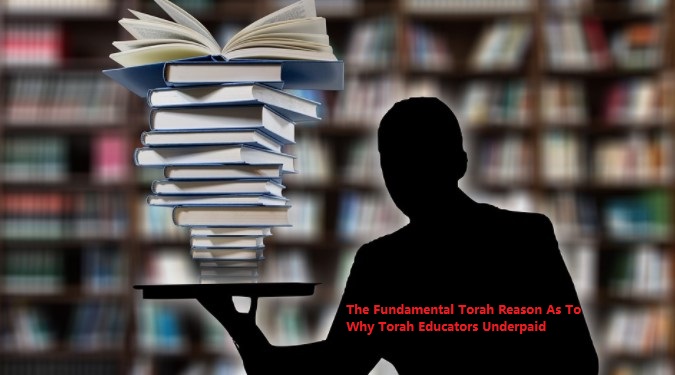
There is the age-old question in the Orthodox Jewish world; why are Torah Educators so underpaid?
We all know that Melamdim, Rabbis, and teachers have one of the most important jobs in Klal Yisroel, they teach Torah to the next generation.
Furthermore, they can build or break a child. Torah Educators have the power to make a child love the Torah and be connected to Hashem or Chas Veshalom the opposite.
Everyone agrees that Torah educators should be paid very well, yet it is one of the most underpaid career. Many Torah educators feel stressed financially due to the low pay of the job, leaving them with less peace of mind or patience to educate our precious children.
In some counties like the United States, tuition prices keeps going up and the government keeps giving grants, but the money does not seem to trickle down to the educators. (In Israel, for citizens, there is no tuition fee, school is free as the government pays the teachers as the government feels it as a national responsibility to teach the Torah to its citizens).
Let’s see what the Torah says about this topic. The Torah says that one may not take any money to teach Halachah.
As it states several times in Gemurah מה אני בחנם אף אתם בחינם Just like Hashem does not take anything from us for teaching us Torah, so too, we cannot not charge for teaching His Torah.
A person who goes into the chinuch field either by opening a school, Yeshiva, Kollel ect. or one who becomes an educator must know that this is not a career to make money. No matter how much the organization will fundraise, no matter how good their intentions are, they will never have enough to pay a “nice salary” for the employees or staff.
Hashem does not want us to charge to teach Torah, and this is why a person will never make lots of money in this field. Educators can get paid for the time they are spending with the students, but not for the actual teaching of Torah. In addition, educators spend a lot of time preparing lectures and marking tests without getting paid for that time, no other job requirs work outside the office without getting paid. This is the nature and zschus of teaching Hashem’s Torah laws and Mitzvahs.
One can ask so how can an educator get paid anything? How does one know how much their time spent with students is worth?
If you had asked parents during Covid-19 how much they would be willing to pay to send their children to school in order for them to be occupied instead of being home for weeks on end, each parent would put a price on what they think that is worth. That price tag, for occupying the children, especially teens, would likely be somewhere close to what educators are getting paid.
The same concept is with Kollelim. If young men were being charged to participate in shiurim instead of getting paid for doing so, there would have people paying for that privilege to learn Torah with their teachers who are Torah giants.
The Gemurah tells the story of a time when people had to pay to enter their Bais Medrish (study Hall). Hillel, who did not have enough money, went to the rooftop, in the cold, just so he can listen to the Torah lectures. After seeing the yearning for Torah, the Rabbis canceled the fee so that everyone can learn Hashem’s Torah.
So why are so many men and women choosing to go into the chinich field as a career knowing that this is not a great paying job? Educating the next generation of Jewish Torah Observing children has a much bigger “payout” and reward than money.
There will of course be the reward in the world to come. A person who teaches Torah is considered to be like a father to his student and his reward is eternal (that is, if he does not ruin the child with a hurtful comment or embarrassing the child in front of the classmates as the punishment for that is the educator to lose his/her place in the world to come.)
A person who has a sharp tongue, temper, etc . should not go into the chinuch field as this may be disaster for their spirituality as the punishment is eternal
המלבין פני חברו ברבים… – אין לו חלק לעולם הבא .)
The satisfaction of teaching is another great reward in this world. There is no other job in the world that brings so much inner satisfaction and happiness to the person than giving over your knowledge and using your skill to help children grow into God-fearing people who love to serve Hashem.
In addition, educators get a lot of experience in dealing with children, they learn about natures and characters of students, and then they automatically have a lot more experience and knowledge when it comes to raising their own children.
During my 15 years as a teacher, I prayed to Hashem saying: Hashem, I am lovingly taking care of your children, please help me with my own children, and B”H, we see Hashem’s great help and Syata Dishmaya with our children.
Tip: I had a student list on my desk and focused on saying something nice or doing something extra for each child every week. I marked the name to make sure that every girl was taken care of. (This may seem easy and simple, however, when you try it in school or at home with your children, you will see it takes effort and will need your complete focus to do something meaningful for each child every week.
I attended a lecture, where a mother of a large family said that she heard it was very important for each child’s mental health that the mother make physical contact with each child every day. Such as a hug or pat on the back, hand, each child according to their age. She said that she thought this was so easy, and she was sure that she already did it every day as she is a very affectionate person. However, once she began focusing on this, she was shocked to discover that she did not do so on a daily or even weekly basis. She challenged the audience to try it and make a conscious effort to connect with their children this way. It was an eye-opener for many at that lecture.
As an educator, you need to do this with words and compliments (not touching) on a daily or weekly bases with each child. This will help the student connect to you and your lessons in a positive, feel good way.
In addition, I had a sheet of paper where I wrote down something special about each girl, whether it was something impressive they added to the lesson, a good deed they did for another student, or anything that can be a compliment to her mother. I looked it over everyday so that I remember it and when I meet their mother in the grocery or at a wedding, I had something very nice to say about their daughter. This always makes for a great relationship between the parents and teacher.
Children who are raised in a simple home, without lots of stuff, in a home filled with love for Hashem and all of His children (especially for your own spouse, ) grow up very happy and well-adjusted with Hashem’s help.


